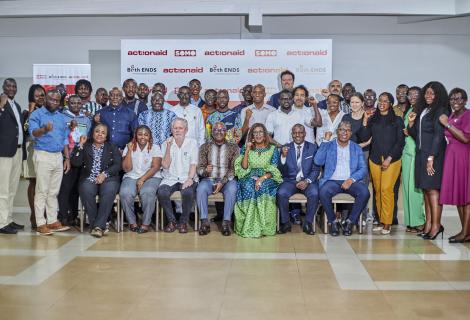Reimagining Investment for People & Planet: ActionAid Ghana and Partners, SOMO and BothEnds Push for Climate-Aligned Policy Frameworks at West African Civil Society Forum.

Across West Africa, investment policy frameworks continue to prioritise profit over people, fueling extractive projects that deepen debt, harm communities, and exacerbate the climate crisis. Despite billions of dollars in annual investment inflows, the region continues to grapple with widening inequalities, environmental degradation, and growing climate vulnerabilities.
Outdated investment treaties many signed decades ago, still shape Africa’s development story, often at the expense of climate goals and community well-being. These frameworks, which largely favour multinational interests, have restricted the policy space governments need to pursue equitable and sustainable development.
In response, ActionAid Ghana, in partnership with SOMO and Both ENDS, convened the first West African Civil Society Forum on “Aligning Investment Policy Frameworks to Climate and Sustainable Development Goals (SDGs)” from 6th to 8th October 2025 at the Mensvic Grand Hotel, East Legon – Accra.
The three-day forum brought together over 70 participants, including civil society organisations, trade unions, academics, and policy experts from across West Africa. Together, they explored bold alternatives for fair, climate-resilient, and rights-based investment policies—building on the Entebbe Declaration of 2024, which called for Africa-led reforms in investment governance.
Rethinking Investment for Sustainable Futures
Discussions at the Forum highlighted how foreign direct investments (FDIs) in extractive sectors account for nearly 65% of total inflows into the region, yet contribute minimally to local development or climate adaptation efforts. Participants noted that resource-dependent economies like Nigeria, Ghana, and Sierra Leone lose an estimated US$10 billion annually through unfair investment agreements and tax exemptions granted to multinational corporations.
These realities have made it clear that investment must be redirected to power resilience—not crisis.
“Strengthen public procurement processes; this will help West Africa align its investment policy frameworks,” one delegate urged, emphasising the need for transparent, inclusive, and locally grounded investment models that advance the SDGs.
Breakout Sessions: Deep Dives into the Issues
To ensure diverse perspectives and practical recommendations, participants were divided into four thematic breakout groups, each focusing on a critical dimension of West Africa’s investment landscape:
Group One: Investment Treaties and Policy Coherence – Explored how outdated bilateral investment treaties constrain national development priorities, urging governments to renegotiate clauses that undermine public interest, climate goals, and policy flexibility.
Group Two: Climate Justice and Extractive Industries – Examined the environmental and social costs of extractive projects, calling for stronger accountability frameworks, community consent mechanisms, and reinvestment of extractive revenues into climate resilience and renewable energy.
Group Three: Gender, Human Rights, and Inclusive Development – Discussed how current investment models marginalise women, workers, and local communities. The group proposed gender-responsive investment frameworks that protect labour rights and promote equitable participation in decision-making.
Group Four: Regional Cooperation and Policy Harmonisation – Focused on building a unified West African position on investment governance through ECOWAS and AU structures. Participants emphasised collective bargaining power, regional data sharing, and aligning investment codes with the African Continental Free Trade Area (AfCFTA) and the SDGs.
Outcomes from these sessions will feed into the Forum communiqué, serving as a roadmap for collective advocacy and reform across the sub-region.
Women Leading the Change
A key highlight of the Forum was the session led by Dr Suzy Nikiema from the International Institute for Sustainable Development (IISD), a globally recognised expert on sustainable investment governance. Dr Nikiema unpacked the complexities of investment treaties and their far-reaching implications for developing economies, inspiring a thought-provoking dialogue on how Africa can redesign its investment landscape to drive equity, climate action, and sustainable growth.
At ActionAid Ghana, we take pride in women leading change, Dr Nikiema’s work is a testament that women are champions and inclusion is key in promoting sustainable development.”
From Dialogue to Action
The Forum culminates today, October 8, 2025, with a media engagement and press briefing to release a communiqué capturing key deliberations and policy recommendations. This document will outline actionable steps toward aligning investment policy frameworks with climate justice and the SDGs, calling on governments, investors, and civil society to ensure that development does not come at the expense of people or the planet.
“Together, we are shaping a future where policies power equity, sustainability, and justice for all,” said ActionAid Ghana’s Country Director, reaffirming the organisation’s commitment to advancing people-centred development.
A Call for Transformative Change
The conversations at the Forum reaffirmed a shared regional vision: that West Africa deserves investment agreements that empower communities, protect the environment, and promote fair, inclusive growth.
As ActionAid Ghana and its partners SOMO and Both ENDS continue this journey, their collective goal remains clear—to reimagine investment as a tool for climate justice, resilience, and sustainable development.
Because development must not come at the expense of our people or our planet.